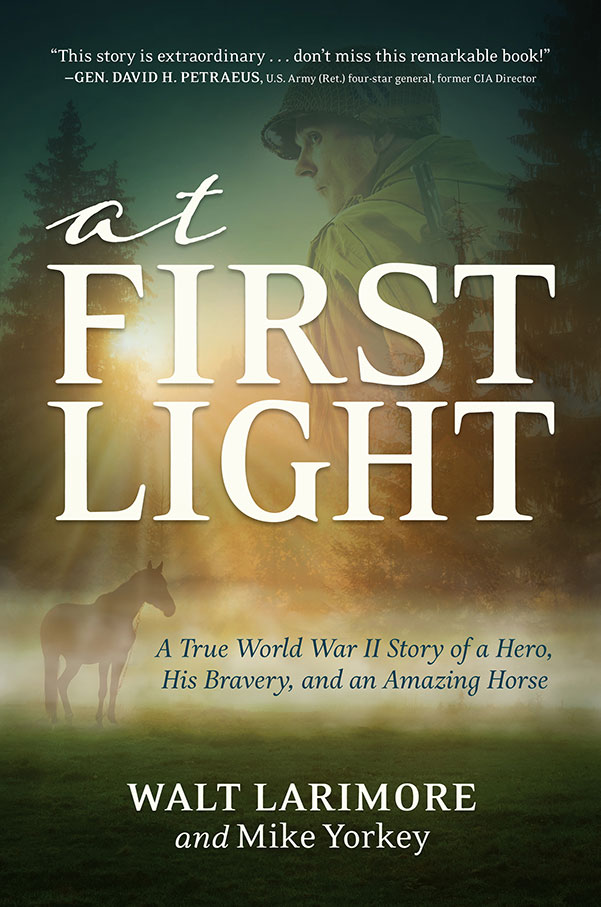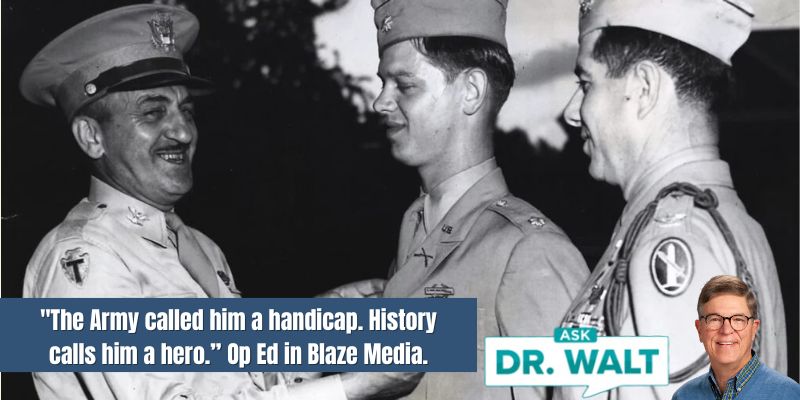
August 26, 1944 – The horrors of the Battle of Montelimar
August 26, 2024
August 28, 1944 – The horrors of Montelimar for the retreating Germans
August 28, 2024August 27, 1944 – Dad and his best friend create a life-long memory fighting together as one
On the morning of August 27, Phil was attached to a reconnaissance patrol with his good friend Ross Calvert, who was then the 3rd Battalion S-2. They had no idea that today would be one of their most memorable of the war.[1]

The men were heading toward the village of Taulignan, about twenty miles north of Vaison-la-Romaine and eighty-five miles north of Marseille, in the Provence region, when they spotted a German roadblock.
They immediately engaged the enemy, killing nine Germans and capturing three more using their powerful Tommy guns.
The men then rejoined Company L to continue the attack on Taulignan, the two buddies deciding to lead the company as first scouts. They encountered another roadblock, killing twelve and capturing eight.
Phil and Ross came across one of their men who’d been wounded by enemy shell fragments and rendered first aid. Ross carried the man fifty yards to the safety of a ditch, while Phil provided suppressing fire with his Tommy gun.
Moving another 300 yards, they selected an outpost from which Ross directed artillery, tank, and TD fire on the principal German position north of Taulignan for thirty minutes, killing ten more Germans.
At this point, in the late afternoon, Ross and Phil led the company through Taulignan while the rest of the regiment quickly cleared the town and began to reconnoiter the route to La Bégude-de-Mazenc, about five miles north.
Phil’s guidebook told him the word bégu was derived from the Provençal verb “to drink,” and bégude meant “drinking place.” So, it was no
surprise when the men approached the hamlet’s edge and spotted thirty bicycles in front of a hotel and tavern.
The American pair slowly moved in, hearing boisterous German voices inside the bar. Apparently, they hadn’t heard the orders to retreat—or had had one too many for the road.
Two Kraut soldiers were walking up the street in semi-darkness, smoking cigarettes and laughing. Ross and Phil snuck up behind them, stuck their Tommy guns in the men’s backs, softly ordered them to halt, and disarmed them.
As they were taking them prisoner, one of the men yelled out to warn his fellow soldiers having a drink in the tavern. Phil jammed the butt of his Tommy gun into the man’s forehead, knocking him unconscious.
The other patrol members placed heavy fire on the building.
After a brief firefight, the Germans inside the tavern surrendered. One of those waving a white handkerchief was a German heavy-weapons company commander who insisted that Phil and Ross join him in the tavern to light up a cigar, sip on a Courvoisier cognac, and comfortably discuss the terms of his complete surrender.
Phil and Ross looked at each other, grinned, and said, “Why the hell not?”
After a “strenuous” one hour of negotiations, which required quite a few refills and fine cigars, the unconditional surrender was accepted.
At 0200 hours on August 28, the 3rd Battalion entered Taulignan. The officers enjoyed hot showers, a few hours of sleep in comfortable beds, and a delicious breakfast of croissants and jam at the Hôtel Bitsch.
While enjoying their petit dejeuner, Phil had a thought.
“Ross,” he began, “when we were fighting yesterday, I realized that we were communicating without words. We were working together just by watching each other and knowing what the other was thinking and doing and going to do.”
Ross nodded as he contemplated Phil’s observation. “You know, you’re right, Daddy-O. Never thought of it, but that’s pretty cool.”
“My platoon and I are the same way now. It reminds me of what an old horseman in Naples taught me about the word dressage, how with training and practice, a horse and rider communicate and cooperate and work together in perfect harmony—like they’re two hearts but one mind. We’ve done that playing bridge together. Now we’re doing it in war.”
Ross smiled and raised his mug of coffee. “Am I the horse or the rider?”
Phil laughed. “I guess we’re both just old warhorses.”
“Here’s to us and those like us. Damn few, and they’re probably dead!”
“Here, here!” Phil exclaimed. Then he offered an early morning toast. “To our coffins,” he began. “May they be made from a hundred-year-old oak tree that is planted tomorrow! To us warhorses, forever!”
When Phil learned that Ross would be awarded the Distinguished Service Cross for his heroism and leadership, he was happy for his friend. But neither one had any idea about the horrors in store for both of them in the next few days.[2]
~~~~~
[1] Larimore, At First LIght, 128.
[2] Ibid, 128-129.
In case you haven’t read or listened to Dad’s book, you can learn more or order it here.
© Copyright WLL, INC. 2024.



